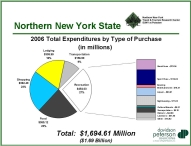Anytime a major plant closure is announced, you can be sure there will be some interesting responses. I didn’t really think it was news.
Read the rest of this entry »
Anytime a major plant closure is announced, you can be sure there will be some interesting responses. I didn’t really think it was news.
Read the rest of this entry »
Tags: economic development·massena
The Vancouver Organizing Committee for the 2010 Olympic and Paralympic Winter Games (VANOC) has hailed the 1980 Winter Olympic Games here in Lake Placid as one of three “Legacies of North American Winter Games“. The report was commissioned to better understand the potential impact of hosting these games in Vancouver.
These reports, separately and combined, show how the host communities of Olympic Winter Games in North America continue to:
Some of the key findings of the Lake Placid Report:
The Lake Placid report is available in PDF format and makes an interesting read. I believe it to be fairly written and captures many of the positive and negative aspects of the story. And, I would agree with most of the report’s conclusions, but I wouldn’t go so far as to believe that having another Winter Olympic Game will give us any marginal benefit. From a tourism marketer’s perspective, Lake Placid’s brand and legacy is a real asset.
It is really interesting to see how various places prepare for hosting “the Olympics”. I’m particularly impressed with the anti-spitting campaign in Beijing. But I suppose it could be carried too far, emphasis mine:
BEIJING, Jan. 10 (Xinhuanet) — Beijing has vowed to eradicate five boorish behaviors among its citizens this year, including spitting and littering on the street.
For the citizens’ convenience, Beijing will set up trash boxes every 100 meters in the city’s major streets and other public areas and provide handy sanitary bags for people to spit into on buses, taxis and other public facilities.
Most Beijingers said hawking phlegm and throwing wastes onto the pavement were among the five most disgusting habits in a survey among 10,000 citizens last November, according to officials with Beijing office for the promotion of social ethics.
It was also considered rude for pedestrians to run about the road amid heavy traffic, for passengers to create a rowdy scrum while getting on buses and for pet owners to allow their animals to relieve themselves on the streets, the officials said at a meeting on the capital’s ethic building Monday.
The Beijing municipal government will work to eradicate these bad behaviors this year, they said.
“Eradicate” sounds a bit harsh, but it’s probably just a bad translation. The BBC seems almost nostalgic about the potential loss of a “cherished tradition” and can’t see the hidden benefit. What they should have focused on are the “hundreds of uniformed “mucus monitors” (who) will patrol the streets handing out free spitting bags.” It’s all about Job Creation. Someone is going to have to adjust their multiplier formula when calculating the additional jobs and wages generated by this bit of genius.
I’ll quit here before I digress any further.
 The Northern New York Travel & Tourism Research Center has released the results of the 2006 Economic Impact of Expenditures by Tourists on Northern New York study. Or more simply know as the NNYTTRC’s 2nd EIETNNY study. Funny, but just like a good blog post, titles are everything.
The Northern New York Travel & Tourism Research Center has released the results of the 2006 Economic Impact of Expenditures by Tourists on Northern New York study. Or more simply know as the NNYTTRC’s 2nd EIETNNY study. Funny, but just like a good blog post, titles are everything.
Here are some key points from their press release (PDF):
This second study was conducted by Davidson-Peterson Associates and provides comparative data to the baseline study done in 2003.
The complete results of this study and previous studies are available on the NNYTTRC’s website in PDF format. Each of the 10 Counties – Clinton, Essex, Franklin, Hamilton, Herkimer/Town of Webb, Lewis, Warren, St. Lawrence, Jefferson, and Oswego – has their own detailed report which contain the results for the entire Northern New York study region, the relevant tourism region (Adirondacks and Thousand Islands), and the county. Other comparative tables also available.
“The Northern New York Travel and Tourism Research Center was created in 2001 in response to the need for tourism research and data collection, as expressed by tourism industry professionals and economic developers in the region.”
I encourage everyone to take a look at their other reports, some really interesting data covering many aspects of our region. What a great resource – a big thanks to Laurie and the rest of the staff there!
Bonus for Adirondack Base Camp readers – Slide Summary – (PPT)
Tags: economic development·taxes·tourism